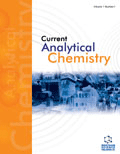
Current Analytical Chemistry
Scope & Guideline
Navigating the landscape of modern analytical chemistry.
Introduction
Aims and Scopes
- Environmental Analysis:
The journal publishes research on analytical techniques for environmental monitoring, including the detection and quantification of pollutants, heavy metals, and emerging contaminants in water, soil, and air. - Biomedical Applications:
A significant focus is on the development and validation of analytical methods for pharmaceuticals, biomarkers, and drug delivery systems, particularly in the context of improving healthcare outcomes. - Nanotechnology in Analysis:
Current Analytical Chemistry frequently features studies on nanomaterials and their applications in sensing, drug delivery, and environmental remediation, highlighting the innovative use of nanotechnology in analytical chemistry. - Method Development and Validation:
The journal emphasizes the importance of developing robust, reproducible analytical methods, including chromatographic, spectroscopic, and electrochemical techniques, with a focus on their validation for various applications. - Computational and Chemometric Approaches:
Research that employs computational methods and chemometrics to enhance analytical techniques, data interpretation, and method optimization is a recurring theme, showcasing the integration of computational chemistry with analytical practices.
Trending and Emerging
- Machine Learning and Data Analysis:
The integration of machine learning and artificial intelligence in data analysis and method development is rapidly gaining traction, with researchers exploring how these technologies can enhance analytical processes and improve accuracy. - Green Chemistry and Sustainable Practices:
There is a growing emphasis on sustainable analytical practices, including green chemistry approaches for method development and the use of eco-friendly materials in analytical processes. - Advanced Nanomaterials for Sensing:
Research focused on the development and application of advanced nanomaterials for sensing, including biosensors and environmental sensors, is trending, highlighting the innovative use of nanotechnology in analytical applications. - Interdisciplinary Approaches:
Current Analytical Chemistry is increasingly featuring interdisciplinary research that combines analytical chemistry with biology, materials science, and environmental science, reflecting a holistic approach to solving complex analytical challenges. - Emerging Contaminants and Environmental Monitoring:
There is a notable increase in research addressing emerging contaminants in environmental samples, driven by heightened awareness of their impact on health and ecosystems, leading to innovative detection and remediation strategies.
Declining or Waning
- Traditional Chromatographic Methods:
There has been a noticeable decline in publications focusing exclusively on traditional chromatographic techniques, as researchers increasingly explore more advanced methods and technologies that offer greater efficiency and sensitivity. - Basic Qualitative Analysis:
Research centered on fundamental qualitative analysis without the integration of advanced techniques or modern instrumentation appears to be waning, as the field moves towards more quantitative, high-throughput methods. - Single-Use or Low-Throughput Methods:
The trend towards sustainability and efficiency has led to a decline in interest in single-use or low-throughput analytical methods, with more researchers favoring methods that can handle larger sample sizes and provide quicker results. - Non-Nanotechnology Based Sensors:
As the field of analytical chemistry increasingly embraces nanotechnology, traditional sensor designs that do not incorporate nanomaterials are being published less frequently, reflecting a shift in research focus. - Conventional Spectroscopic Techniques:
The exploration of conventional spectroscopic techniques is decreasing as newer, more sophisticated techniques gain prominence, particularly those that integrate computational analysis for enhanced data interpretation.
Similar Journals
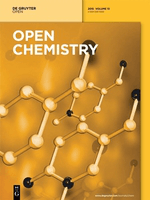
Open Chemistry
Bridging Gaps in Chemical Sciences with Open AccessOpen Chemistry, published by DE GRUYTER POLAND SP Z O O, is a distinguished peer-reviewed journal that has been serving the global chemistry community since its inception. With an ISSN of 2391-5420 and an E-ISSN also of 2391-5420, this open-access journal has been accessible to researchers and practitioners alike since 2015, ensuring a wide dissemination of high-quality research findings. Located in Germany, specifically at BOGUMILA ZUGA 32A STR, 01-811 WARSAW, MAZOVIA, POLAND, Open Chemistry aims to publish innovative research across various chemical disciplines, with special attention to miscellaneous chemistry and materials chemistry. It is currently ranked in the Q3 category for both fields as of 2023, reflecting its solid standing within the academic community, with specific ranks of 187/408 in General Chemistry and 153/317 in Materials Chemistry, corresponding to respective percentiles of 54 and 51. Open Chemistry not only enhances the accessibility of cutting-edge research but also serves as a vital resource for students, professionals, and scholars seeking to advance their knowledge in the rapidly evolving landscape of chemical sciences.
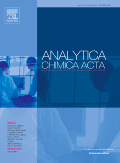
Analytica Chimica Acta
Advancing the frontiers of analytical chemistry.Analytica Chimica Acta is a prestigious peer-reviewed journal published by ELSEVIER, renowned for its significant contribution to the fields of analytical chemistry, biochemistry, environmental chemistry, and spectroscopy. Established in 1947, this journal has solidified its reputation, reflected in its impressive impact factors and Scopus rankings, including a Q1 classification in Analytical Chemistry and Spectroscopy, and a Q2 ranking in both Biochemistry and Environmental Chemistry. With its comprehensive scope, Analytica Chimica Acta aims to publish innovative research, critical reviews, and technical notes that advance the understanding and application of analytical methods. As an essential resource for researchers, professionals, and students alike, it encourages the dissemination of high-quality research that addresses contemporary challenges in chemical analysis and promotes interdisciplinary collaboration. While the journal operates primarily on a subscription basis, it also offers unique opportunities for authors to reach a broad audience and engage in the global scientific discourse.

LCGC North America
Cultivating Knowledge in the Heart of Analytical ScienceLCGC North America is a pivotal resource in the field of Analytical Chemistry, published by MJH Life Sciences. Since its inception in 1999, the journal has strived to bridge the gap between scientific research and practical applications, catering to a diverse audience that includes researchers, professionals, and students interested in chromatography and related analytical practices. Although currently categorized in the Q4 quartile of Analytical Chemistry, with a Scopus rank of #137 out of 156, LCGC North America is dedicated to delivering insightful articles that foster discussion and innovation within the analytical chemistry community. With a commitment to quality content, the journal covers a broad spectrum of topics, ensuring that readers remain informed about the latest developments and trends in the field. Despite its non-open access model, readers can access its valuable resources through institutional subscriptions and various library networks, making it a vital asset for those engaged in cutting-edge research and practice. Located in Cranbury, NJ, United States, LCGC North America continues to contribute significantly to the advancement of analytical methodologies and technologies.
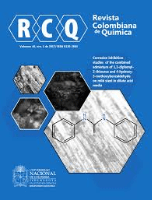
Revista Colombiana de Quimica
Exploring Diverse Frontiers in Chemical Research.Revista Colombiana de Quimica, published by the Universidad Nacional de Colombia, Departamento de Química, is a distinguished open access journal that has been serving the chemistry community since 1971. With an ISSN of 0120-2804 and an E-ISSN of 2357-3791, this journal presents a platform for researchers, professionals, and students to share and disseminate their findings in the field of chemical sciences. Positioned in the Q4 quartile in the 2023 rankings, this journal focuses on a diverse spectrum of topics within general chemistry, cultivating a rich discourse among scholars and practitioners in Colombia and beyond. Although the journal currently ranks 294 out of 408 in the field, its commitment to open access research ensures that valuable scientific knowledge is accessible to a wider audience, thus facilitating collaboration and advancement in the chemical sciences. As it converges from 2008 to 2022, the Revista Colombiana de Quimica remains a vital resource for anyone looking to contribute to or stay abreast of developments in chemistry.

ACTA CHROMATOGRAPHICA
Empowering the Chemistry Community through ResearchACTA CHROMATOGRAPHICA is a distinguished academic journal dedicated to the field of chromatography and its applications, published by AKADEMIAI KIADO ZRT. With a history spanning from 1996 to 2024, this journal serves as a vital platform for the dissemination of innovative research and advancements within the field, contributing significantly to the body of knowledge in the domain of general chemistry. Operating out of Budapest, Hungary, ACTA CHROMATOGRAPHICA holds a Q3 ranking in the chemistry category as of 2023, reflecting its impact and relevance among its peers, achieving a Scopus ranking of 180 out of 408 in the General Chemistry category, placing it in the 56th percentile. While not currently Open Access, the journal offers robust subscription options for readers and institutions seeking to stay informed on the latest developments in chromatography. FACTA CHROMATOGRAPHICA aims to foster communication, collaboration, and discovery, making it an essential resource for researchers, professionals, and students seeking to enhance their expertise in this evolving field.

Talanta Open
Bridging Gaps in Chemical Knowledge SharingTalanta Open (ISSN: 2666-8319) is a prominent open-access journal published by Elsevier, dedicated to advancing the field of Analytical Chemistry. Established in 2020, the journal aims to foster innovative research and facilitate knowledge sharing in the analysis of chemical substances and their interactions. With an impressive Q2 ranking in the Analytical Chemistry category and a commendable Scopus ranking of #57/156, Talanta Open has quickly established itself as a vital resource for researchers, professionals, and students alike. The journal is known for its rigorous peer-review process and commitment to quality, ensuring that published content significantly contributes to the scientific community. By providing unrestricted access to high-quality research, Talanta Open underscores the importance of collaboration and accessibility in the ever-evolving landscape of analytical science.
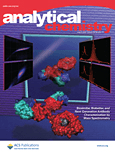
ANALYTICAL CHEMISTRY
Transforming Complex Systems into Clear SolutionsANALYTICAL CHEMISTRY, published by the American Chemical Society, is a leading journal in the field of analytical chemistry, with a significant impact factor reflecting its reputation and scholarly influence. With an impressive ranking of 14th out of 156 in its category, placing it in the 91st percentile among its peers, this journal is essential for researchers, professionals, and students alike who are looking to stay at the forefront of developments in analytical techniques and methodologies. Established in 1947, ANALYTICAL CHEMISTRY covers a broad range of topics within the discipline, all aimed at advancing the scientific community's understanding of complex chemical systems. Although currently not an Open Access journal, its rigorous peer-review process ensures the publication of high-quality research aimed at significant innovations in the analytical field. With its publication spanning up to 2024, it continues to be a valuable resource for those seeking to enhance their research and contribute to the global discourse in analytical chemistry.

Separation Science Plus
Fostering knowledge exchange in analytical advancements.Separation Science Plus is an emerging academic journal dedicated to advancing the field of analytical chemistry and separation science. Published by WILEY-VCH Verlag GmbH, this journal provides a platform for researchers to disseminate high-quality studies and reviews that address innovative techniques and breakthroughs in separation methodologies. With its ISSN 2573-1815, the journal has made significant inroads since its inception in 2018, encompassing a convergence period until 2024. Despite currently holding a Q3 ranking in Analytical Chemistry and a Q4 ranking in Filtration and Separation, its dedication to publishing impactful research makes it a vital resource for professionals and students alike. The journal operates under the robust scholarly reputation of WILEY, which is known for its commitment to excellence in scientific communication. Researchers interested in the latest advancements in separation techniques will find Separation Science Plus an essential read, fostering the exchange of knowledge and facilitating greater understanding within this specialized field.
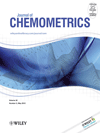
JOURNAL OF CHEMOMETRICS
Innovative Approaches to Chemical AnalysisJOURNAL OF CHEMOMETRICS is a prestigious journal published by Wiley that has been a cornerstone in the fields of analytical chemistry and applied mathematics since its inception in 1992. With an ISSN of 0886-9383 and an E-ISSN of 1099-128X, this journal occupies a notable position, reflected in its Scopus rankings where it holds the 90th rank in Applied Mathematics and the 56th rank in Analytical Chemistry. The journal, based in the United Kingdom, spans a converged publication timeline through 2024, meticulously exploring the interplay between chemical data analysis and mathematical methodologies. Though currently not open access, it offers essential insights through high-quality research articles that significantly contribute to advancing the understanding of chemometric techniques and their applications. With an impact factor demonstrating robust academic recognition, the JOURNAL OF CHEMOMETRICS serves as an invaluable resource for researchers, professionals, and students aiming to excel in the ever-evolving landscape of chemical data interpretation.
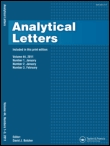
ANALYTICAL LETTERS
Advancing Insights in Analytical ChemistryANALYTICAL LETTERS is a reputable journal published by Taylor & Francis Inc, focusing on the dynamic fields of analytical chemistry, biochemistry, and clinical biochemistry. With an ISSN of 0003-2719 and an E-ISSN of 1532-236X, the journal has been a platform for scholarly articles since its inception in 1967, and is set to continue its contribution to the scientific community until 2024. Despite its classification in Q3 across various categories as of 2023, including analytical chemistry and spectroscopy, ANALYTICAL LETTERS maintains a significant impact within its field, evidenced by its moderate rankings within Scopus. This journal serves as a vital resource for researchers and professionals seeking to explore recent advancements in analytical methodologies, instrumentation, and applications, facilitating the dissemination of critical insights in laboratory practices. With access primarily through institutional subscriptions, it remains positioned as a crucial tool for those advancing knowledge and innovation in analytical sciences.